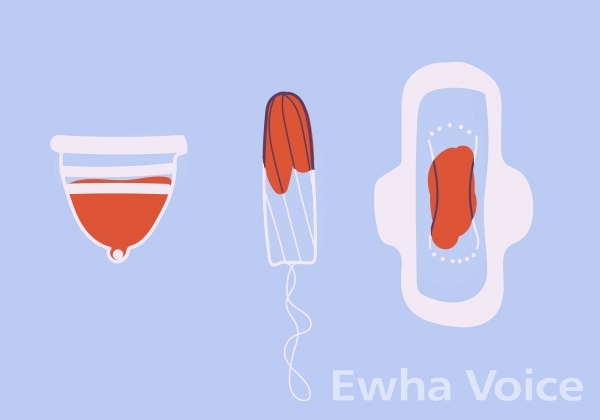
Oftentimes, menstruation is described as a sort of “magic” that visits women once a month. Though it is a natural physiological phenomenon that half of the human race experience throughout most of their lives, the word menstruation itself is constantly replaced by euphemisms. However, behind these artful expressions lie the many challenges faced by women coping with menstruation.
For instance, in 2016, a shocking account came to light of a teenage girl who could not afford to buy sanitary pads and had used a shoe insole as a last resort. Her story soon brought to the surface the reality that low-income women face every month prompting discussions on menstruation.
Six years after the incident, what has changed? Ewha Voice conducted interviews with a range of people to look at the reasons for such difficulties and how to improve the situation.
Menstruation through the global citizens’ eyes

South Korea’s Ministry of Gender Equality and Family (MOGEF) provides feminine products for low-income female adolescents. However, according to MOGEF, the proportion of the actual number of beneficiaries takes up only about 2.8 percent out of about 3.9 million female adolescents as of 2021.
Such statistics reveal that not every woman's menstrual rights are respected and that appropriate education or support is lacking. Then, does this tendency only apply to Korea? To figure out how menstruation is perceived by different communities, Ewha Voice interviewed students of different nationalities.
Sasina Nartudom, an international student studying at Ewha shared the case in her home country of Thailand.
According to Nartudom, the majority of Thai people treat menstruation as something filthy and something that must be hidden. Terms such as “วันนั้นของเดือน,” denoting “the day of the month,” or “wan-daeng-duad,” which can be interpreted as “the red day,” are used instead of using the actual word. It even used to be a taboo to let men see, hold, or buy menstrual pads for women, even if the men were family members. She also had to hide feminine products as though she were committing an illegal act and felt embarrassed to buy such items.
However, Nartudom explained that Thailand is currently going through a transition period. Some elderly Thais might still have a conservative mindset, thinking, for example, that women are implying they are seducing the opposite gender when talking about their periods. However, people of the new generation of Thailand tend to have conversations about the topic more publicly.
“Menstruation is just the normality of a woman’s body, the way our body functions, and it shows the healthiness of women,” she said. “Women will be able to speak about it frankly when we stop treating it as something disgusting.”
To share the situation of Mexico, May Garcia Ana Karla, who studies at Pusan National University, provided her views.
According to May, although the stigma has been erased these days, Mexican women tend to hide their experiences and concerns if there are men present in the room.
To avoid directly mentioning menstruation, euphemisms such as “Me llego Andrés,” which can be translated into “Andrés arrived,” or “Me bajó,” meaning “it came down,” or “it came to me,” are used.
As a foreign student who has been living in Korea for a year and a half, May felt that Korea is too secretive about subjects related to sex, periods, and contraception. She personally talks freely about periods thanks to her implant, which is a form of birth control that is injected into a woman’s body. However, she wishes that people would give menstruation the attention it deserves, as it is a natural process that every woman has to endure.
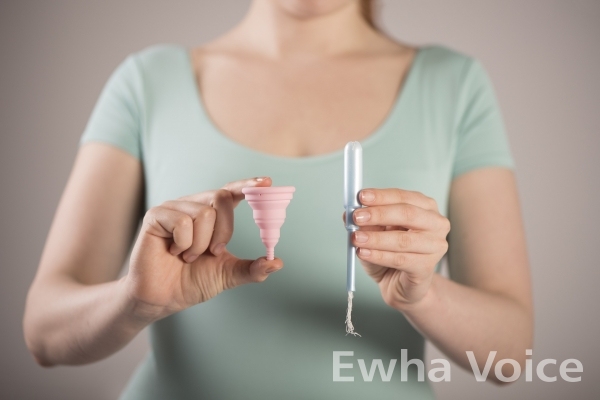
Ahn Hyuntae, a Korean man who is in his 20s, opened up that he has never seen it as something squalid or that has to be hidden, adding he rather views it as a natural physiological phenomenon that happens to women in order to produce healthy eggs.
Through interactions with his male peers, Ahn has noticed that there are two common ways that men view periods. Some feel sorry for women on their periods and try to be helpful to support them in any way. Others treat menstruation as a sensitive time of the month, which mostly applies to men who are not sufficiently aware of such topics.
Ahn revealed that he actually had conversations about it with his female peers. He was able to learn more about it while not feeling any awkwardness.
Since Ahn has never received any type of instruction regarding the subject, he hopes that an environment where people can have unfiltered discussions and get proper education could be formed.
Tyson Yi, an exchange student from Central Washington University, described the circumstances in the United States.
Due to the existence of broad culture in the United States, Yi mentioned that how people treat such topics mostly depends on the environments and households that they have been brought up in.
From his personal experience, he has been talking about it quite openly with his mother, friends from high school, and his past partners. He has also seen women being confident in conversations and in carrying feminine products. Of course, it is still a subject that many women generally feel uncomfortable with.
Yi sees menstruation as the reason for all human life and something that should not be seen as a dirty secret. Stressing that he cannot speak on behalf of all American males, he believes that many men in his community feel similarly about it as he does.
Besides general education and the vague passing-by information, Yi picked up related information from his romantic partners. From general knowledge such as flow, duration, and cycle, to more personal areas like how menstruation affects women’s emotions and bodies, his partners have been the main source of understanding menstruation.
Regarding the reasons for such an atmosphere being formed where women cannot freely talk about periods, Yi pointed out that it is due to the lack of both the confidence and skill to be emotionally vulnerable. From his half-a-year-long exchange experience, he realized that many topics go unspoken in Korea, inferring the cause to be the male-dominated culture of Korea.
“Many women still sit separately in family gatherings, are assigned to kitchen tasks, and their voices can largely go ignored along with other physical reminders,” he said. “In addition to the listed factors and the maintenance of conventional roles that each gender is expected to play, thesehave perpetuated a culture that makes it challenging for women to speak casually about the issues that only women go through.”
Although it takes courage to break into a place of comfort and acceptance, Yi highlighted having numerous conversations with people and letting them know that periods are a part of the beauty of women.
We do not receive menstruation with adequate education
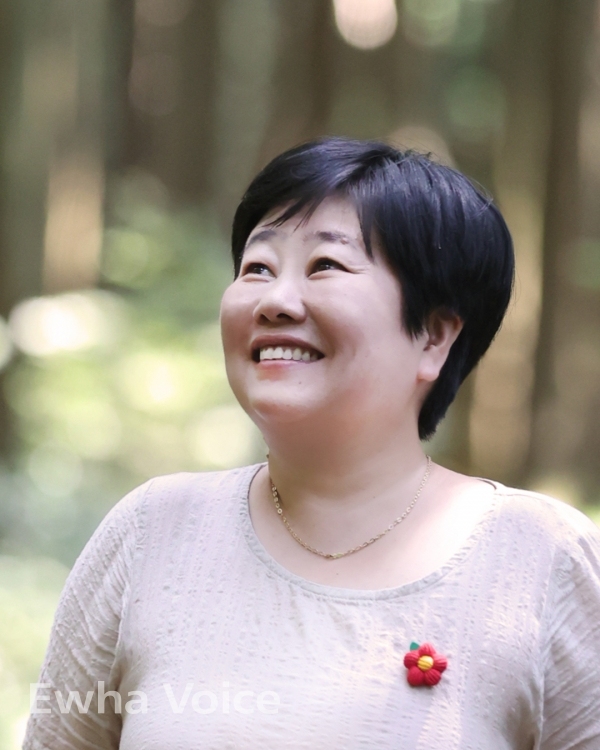
In order to look at menstruation without misinterpretation, proper education must be provided first. Shim Yoonmi, CEO of eco- friendly menstrual cup brand LunaCup, has been giving lectures on menstruation for several years. Founded in 2018, LunaCup is one of the few domestic menstrual cup brands and the only one that provides education on menstruation itself. As a member of the Korean Women’s Environmental Network who witnessed the 2017 scandal involving hazardous substances in sanitary pads, she felt the need for a healthy alternative to sanitary pads and developed LunaCup in response.
Shim expressed her concern at the sheer seriousness of the situation she notices whenever conducting lectures.
“In the midst of a talk, I sometimes get questions from the audience that they cannot figure out how to put the cup in, failing to use it after all,” she remarked. “I thought the need for knowledge was more urgent than developing or supplying sanitary products, and that is why I started educating.”
What she felt was that a huge psychological wall exists for women, making them more uncomfortable about facing their own vulva than the possibility of doing something unsanitary or harmful to themselves.
As a solution, Shim emphasized the increase in menstruation education and that the country should take more action to care for women’s health.
“From menarche to menopause, menstruation stays with us for a lifetime, but we receive it without much information,” Shim said. “Also, no guarantee of the right to live with healthy menstruation brings health problems, which can even threaten basic human rights.”
As part of this, she suggested the need for free sanitary pads at the national level. According to the statistics by the Korea Consumer Agency in 2019, Korea was ranked the highest among 36 OECD countries in sanitary pad prices. Shim pointed out that it is a matter of the government’s will, as the amount needed to offer complimentary sanitary pads would not significantly affect the nation’s whole annual budget.
She also expressed that although our society is aware of the stigma surrounding menstruation, it is important to understand why this has happened at first. To realize this, Shim plans to lead more fundamental menstruation education in the future.
“Fortunately, we live in an era where perceptions are changing,” Shim said with a smile. “Until time passes and the current trend completely settles into shape, my struggle to promote healthy menstruation for women throughout the world will never stop.”
Stigma of menstruation has always been with humanity
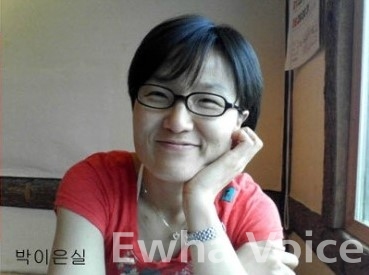
Menstruation is a natural biological process that women go through during childbearing years, but it has long remained undiscussed because it only occurs for women. Thinking of the need for social discussion of the current situation over menstruation, Popho Eun Sil Bark-Yi got the urge to bring it into the world by writing a book. “Politics of Menstruation,” a book that examines and talks about how menstruation has been regulated in human history, began with her thoughts.
As in the case of Thailand and Mexico, where menstruation is described as “the red day” or “it came down,” the social atmosphere that prohibits menstruation tacitly is not just a problem in Korea. Though it is unclear to determine the exact period when these perceptions took hold around the world, she believes it has always been anywhere that presupposes and assumes the male body as the default of human beings.
She also criticized the common way of expressing menstruation in Korea. We often use the terms “wolgyeong” and “saengni,” both of which mean menstruation in Korean. However, the basic dictionary definition of saengni is a “biological function and action of an organism.” The point is that the term includes all the natural phenomena that occur in the body, but we use it more commonly than the original word to explain in a euphemistic way.
There has been lots of ongoing work to help improve the situation. Many authors including her have published books about periods, and many women’s organizations have conducted campaigns to improve cultural perceptions. Several issues have also been raised on sanitary pad VAT to solve the menstrual poverty low-income women suffer from.
She described that those public discussions must take precedence first and foremost, just as various individuals and groups have taken action. She also stressed that the most important and urgent task is to eliminate the customary wisdom of setting non-menstrual bodies as the human default.
When asked about her goals and wishes, she hoped things would be done gradually to guarantee the menstrual rights of all women. Specifically, she proposed that policies such as providing free sanitary pads and reducing the VAT on such products should be implemented as soon as possible. And finally, when such changes begin to occur, she has pledged to work harder in her own right for their advancement.
Breaking the mold of typical sanitary pad commercials
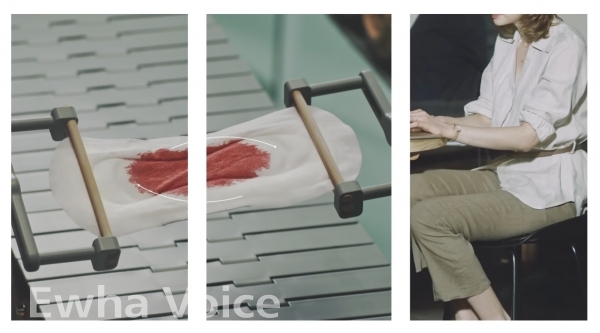
Rephrasing menstruation as “the day,” depicting a woman doing dynamic activities in white clothes, and showing blue liquid to represent blood are the most common motifs of Korean sanitary pad advertisements. Naturally, such commercials do not reflect reality.
However, a number of companies have launched groundbreaking advertisements that break away from this narrow view. Ewha Voice asked Rael to explain how such changes came out.
Rael, a Korean wellness care brand for women, grabbed the spotlight in 2019 when it produced a sanitary pad commerical showing some uncomfortable yet realistic situations women face during their periods.
When asked how the advertisement was proposed at first, Kang Kyu-lin, a brand manager of the marketing team at Rael, replied that it was merely a simple decision.
“Neither wearing white pants during periods nor shedding blue blood is relatable at all,” she said. “Therefore, we wanted to show some footage that every woman could empathize with.”
However, Kang stated that the advertisement did not receive only positive reactions. Although most women acclaimed and welcomed such changes, some people expressed discomfort, arguing that it was too explicit. She further added that specific scenes had to be cut to meet the Korean broadcasting regulations.
Rael was obviously concerned about the unprecedented step they were going to be taking before releasing the commercial. But reforming recognition was something that had to be done someday, and if it were going to happen, Rael wanted to pave the new way themselves.
The aftermath was dramatic. Kang said that she could more commonly find other advertisements featuring actual blood. Moreover, even after 4 years, the public still acknowledge Rael as the first brand to take the initiative.
Although Rael could sense the changes that have been brought about in response, in Kang’s opinion, there is still a long way to go to improve the perception of menstruation.
Kang hopes that more corporations dedicate themselves to redefining the atmosphere of feeling ashamed about menstruation and keep sending such much-needed messages to women.

